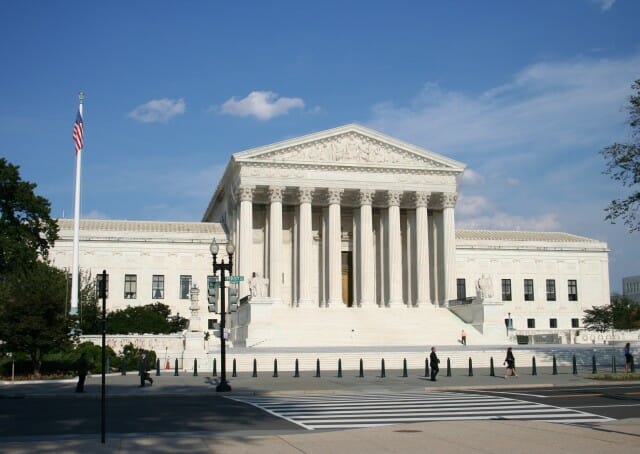The Supreme Court of the United States (SCOTUS) today issued a decision rejecting Nebraska and Oklahoma’s challenge to Colorado’s marijuana legalization. By a 6-2 vote, the Justices denied Nebraska and Oklahoma’s motion for leave to file a complaint, without providing an explanation.
The Court’s two most conservative Justices, Justices Clarence Thomas and Samuel Alito Jr., filed a written dissent. Justice Thomas wrote that “[t]he plaintiff states have alleged significant harms to their sovereign interests caused by another state. We should let this complaint proceed further rather than denying leave without so much as a word of explanation.”
Nebraska and Oklahoma sued Colorado for legalizing marijuana, alleging marijuana from Colorado has strained Nebraska and Oklahoma’s financial and legal resources and forced them to spend time and money making arrests, housing criminals, impounding vehicles, and seizing drugs. The lawsuit did not seek to require Colorado ban the personal use of marijuana or prosecute marijuana use as a crime. The lawsuit instead sought to shut down Colorado’s legalization program that allows for legal growing and distribution of marijuana.
In December of 2015, the Federal Government weighed in after SCOTUS requested the opinion of the Obama Administration. The Solicitor General (the federal government’s top attorney) recommended SCOTUS not hear the case at all.
In his amicus curiae brief on behalf of the Solicitor General’s Office, Solicitor General Donald Verrilli, Jr. took Colorado’s side, arguing that the lawsuit does not fall under the Court’s original jurisdiction and, therefore, SCOTUS has no power to take the case. Specifically, the Solicitor General wrote that:
[Nebraska’s and Oklahoma’s] motion for leave to file a bill of complaint should be denied because this is not an appropriate case for the exercise of this Court’s original jurisdiction . . . Entertaining the type of dispute at issue here — essentially that one State’s laws make it more likely that third parties will violate federal and state law in another State — would represent a substantial and unwarranted expansion of this Court’s original jurisdiction.
SCOTUS may have been swayed by the brief, or may have had other reasons for rejecting Nebraska and Oklahoma’s challenge. What is most important about this decision is that the highest court in our country just refused to consider a challenge to state-legal marijuana. This is a big win for proponents of marijuana legalization across the country.
In Nebraska And Oklahoma Sue Colorado for Legalizing Cannabis, in which we expressed the following concerns (among many) about this case and correctly hinted that we did not foresee the Supreme Court taking this case on and issuing a decision on the merits:
- We are troubled by this lawsuit because we are of the strong view that the votes of people in one state should not be cancelled by the mores of another state. We also support the federalist ideal of allowing individual states to experiment, with the other states free to decide for themselves whether to do likewise or not. There is something inherently wrong with Nebraska or Oklahoma seeking to tell Colorado what to do. How would Nebraska’s citizens feel about New York State suing Nebraska in an effort to dictate how Nebraska runs its corn program? After all, much Nebraska corn goes to New York.
- The Supreme Court generally does not like hearing politically charged cases “before their time.” The legalization experiment is too new to provide much evidence on anything, including which way the political winds will eventually blow. Why rule on this case now when you can wait beyond 2016 to see better both the impacts of legalization and more votes by the American people? A decision by the Supreme Court not to take this case will likely invigorate those seeking legalization and cause some states on the precipice of legalizing to tip towards legalization. It might even cause the good citizens of Nebraska and Oklahoma to rise up and question why their state governments choose to blame another state for their own shortcomings.
Similarly, in Federal Government Supports Cannabis Industry in Critical Supreme Court Case (Nebraska and Oklahoma v. Colorado), we again hinted that we did not see the Court issuing a full decision and stated that we would take whatever kind of win we can get:
It’s great for the cannabis industry to see the federal government’s number one attorney telling SCOTUS that it lacks jurisdiction to hear this case. Nonetheless, these arguments are all based on procedure, not the actual merits of the case. Essentially, the Feds are trying to knock out the suit without having to navigate any of the factual or legal issues in play, including whether federal law preempts Colorado’s recreational marijuana laws.
Though we would really like to see the Feds tout the tenets of the Cole Memo and admit that there is no federal preemption if a state opts to legalize marijuana through a robust licensing and taxation system, if SCOTUS dismisses the suit on procedural grounds it will still be a big ‘W’ for our industry.
Above all else, we hope and predict that this decision will cause states like Oklahoma and Nebraska not to waste their own taxpayers’ money butting into the affairs of neighboring states.

























